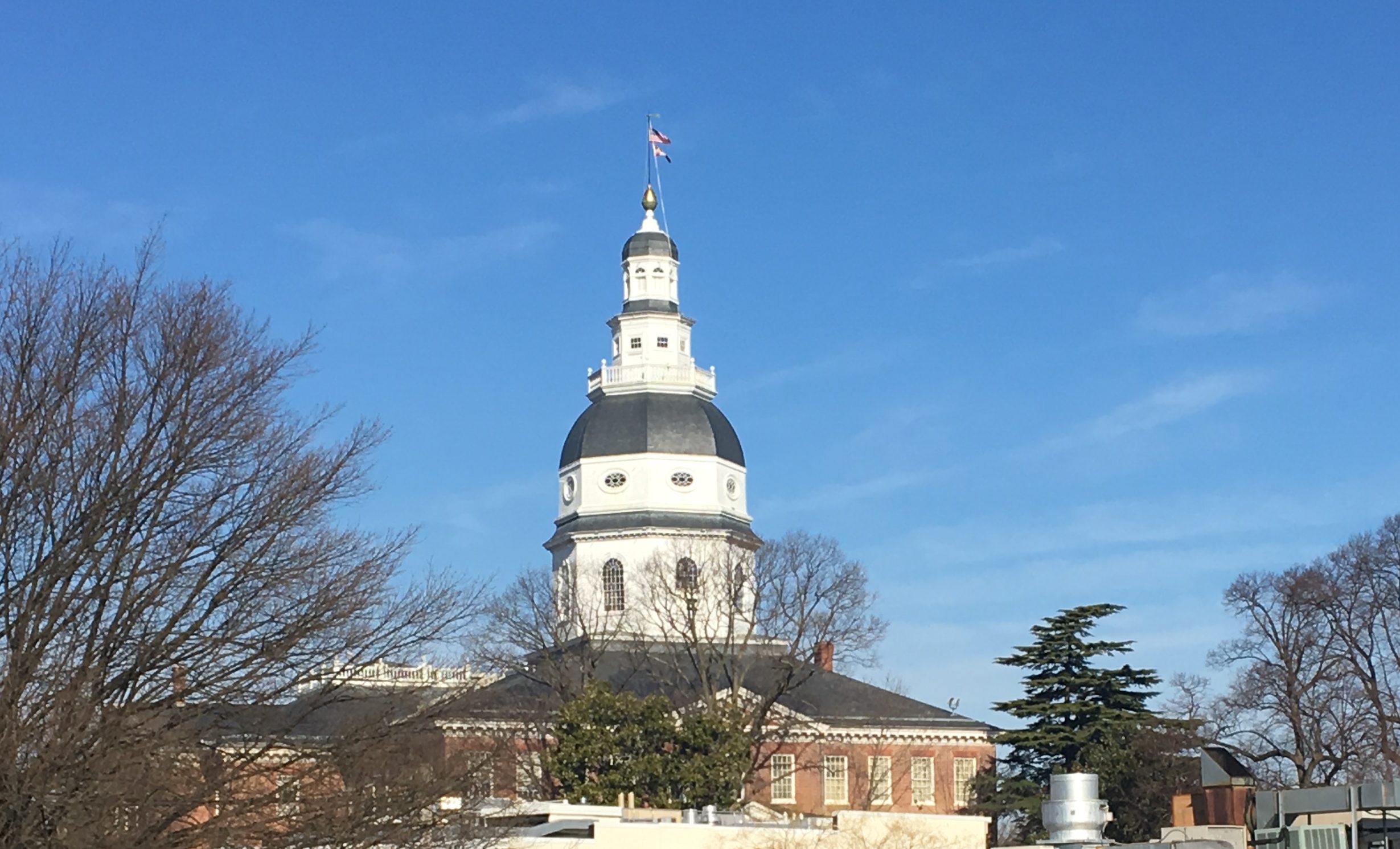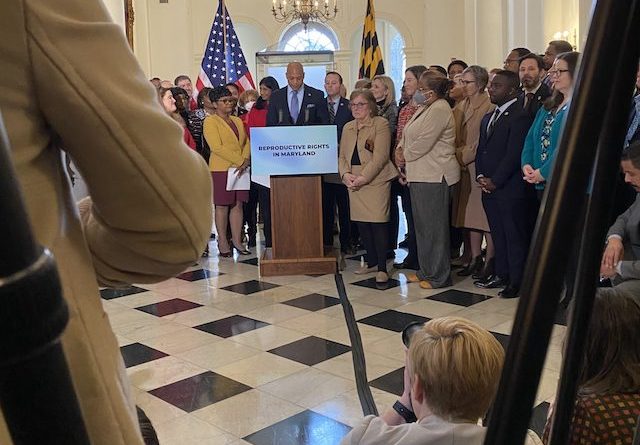Moore, Miller, legislative Democrats announce legislation protecting abortion rights
By KARA THOMPSON and GREG MORTON
ANNAPOLIS, Maryland — Maryland’s top legislative leaders and Gov. Wes Moore and Lt. Gov. Aruna Miller lent their support Thursday to a slate of bills to protect abortion rights—including a constitutional amendment, which would put the issue to voters in the next statewide election in 2024.
“Reproductive care must be a right enshrined in our Constitution, so it can never be up for debate or used as a bargaining chip,” said House Speaker Adrienne Jones, D-Baltimore.
Jones on Monday introduced HB705, which would cement abortion rights into the Maryland Constitution. Jones previously introduced the bill during the 2022 legislative session, where it died in the Senate chamber, and former Speaker of the House Michael Busch, D-Anne Arundel, also introduced a version of the measure in the 2019 legislative session.
HB705, also known as the Right to Reproductive Freedom, states that every individual “has the fundamental right to reproductive freedom, including but not limited to the ability to make and effectuate decisions to prevent, continue, or end one’s own pregnancy.” It also says that the state cannot “deny, burden, or abridge” this right without a justification by a “compelling state interest achieved by the least restrictive means.”
If passed, the question would be placed on the statewide ballot in 2024, asking voters whether to amend the state’s constitution to include the protection of reproductive rights.
“This year, now in a post-Roe/Dobbs environment, it’s absolutely critical that we as a state put in our state constitution the state protection that wasn’t necessary last year when the U.S. Constitution was our protection,” said Senate President Bill Ferguson when asked why this bill did not pass previously. “The world has changed as a result of the Dobbs case, and so now that’s why it’s so essential this year that this bill pass.
In June 2022, the Supreme Court of the United States ruled in the case Dobbs v. Jackson Women’s Health Organization that the U.S. Constitution does not guarantee the right to an abortion. This new ruling overturned the 1973 Roe v. Wade decision, as well as Planned Parenthood v. Casey from 1992.
In the wake of the Dobbs decision, lawmakers in some states have mobilized to codify abortion rights. While 17 states and the District of Columbia have laws on the books that explicitly protect abortion rights, the Dobbs decision and its aftermath has prompted some states to search for more permanent, harder-to-reverse solutions to protect abortion rights.
“We’re going to make sure that Maryland is a safe haven for abortion rights long after I’m governor,” said Moore at the news conference Thursday.
In California, Michigan and Vermont, voters approved similar amendments enshrining abortion rights into their state constitutions. Meanwhile, 71% of Maryland voters agreed that Maryland should guarantee the right to an abortion in its state constitution, according to a poll conducted in October by The Baltimore Sun and the University of Baltimore. Should this bill pass, Maryland would become the fourth state to constitutionally protect abortion rights explicitly.
Maryland’s prospective status as one of the early adopters of this kind of constitutional amendment means lawmakers and experts alike expect impacts of this legislation to reverberate outside of the state. At Moore’s press conference, lawmakers stressed the need to make it easy for people from out of state to access the kind of reproductive care available in Maryland, particularly people from West Virginia, a border state that has enacted a total ban on abortion. In 2020, a time period before the Dobbs decision, 9% of abortions were obtained by people traveling outside their state of residence according to the Guttmacher Institute.
“(We want to send the message) that Maryland is a welcoming state to all people, that we believe in the freedom of choice, individuals’ rights to their reproductive health, and we are a safe place for women and families who want to seek that element of decision-making in their own lives,” said Delegate Lily Qi, D-Montgomery.
Others stressed the need to support health care providers in the wake of increased demand from outside of the state.
“In Maryland, like in many states that provide access to abortion, there has been an increase in our patient load for some of our providers, particularly providers that border West Virginia,” said Del. Ariana Kelly, D-Montgomery.
In addition to the bill to amend Maryland’s Constitution, lawmakers also introduced legislation aimed at other aspects of reproductive rights.
Among these are SB341/HB477, which would require the constituent institutions of the University System of Maryland, Morgan State University and St. Mary’s College of Maryland to offer reproductive services to their students, SB786/HB812, which regulates the disclosure of information regarding legally protected health care, and SB859/HB808, which prohibits judges from requiring testimony or statements in cases alleging violations of criminal law regarding legally protected health care. Each of these bills has been cross-filed, meaning they have been introduced simultaneously in both chambers of the state legislature.
“There are four bills that are headed to the floor—all of which I support—that will protect abortion access, privacy, and out-of-state patients,” said Moore. “Myself and the lieutenant governor, we not only support these bills; when these bills make it to my desk, I will sign them.”
The bill to codify abortion rights through a constitutional amendment has 81 sponsors in the House, all of them Democrats, and its Senate counterpart has support from 20 senators, also all Democrats.
Republicans, who are outnumbered in both chambers of the state legislature, are hesitant to lend their support.
“We just have a philosophical concern about putting (abortion) in a constitutional amendment,” said Minority Leader Jason Buckel, R-Alleghany, adding that he felt the bill did an inadequate job of addressing concerns around late-term abortion.
When asked by Capital News Service reporters about Marylanders’ broad support for constitutional protection of abortion, he seemed dubious of how the question was framed.
“I think if you ask (Marylanders) in general, do you think that women should have an unfettered right to abortion up to a certain point, is that 15 weeks? Is that the first trimester? Is it the second trimester?” said Buckel, who said he thinks most Marylanders would want a limit. Buckel also acknowledged both broad and personal support for abortions to protect the mother and abortions in case of rape or incest. “If you just ask the question, we have a constitutional amendment to abortion and you leave out the fact that that would enshrine the right to late-term elective abortions, I think people’s mentalities change on that issue.”
Other Republicans’ opinions were less nuanced.
“I am a pro life candidate,” said Del. Terry Baker, R-Allegany and Washington.
“Claiming that abortion access needs to be expanded is outrageous when Maryland has some of the highest abortion rates in the nation due to the permissive language used in our state laws and a lack of regulation,” said Del. Kathy Szeliga, R-Baltimore; Del. Ryan Nawrocki, R-Baltimore, and Del. Lauren Arikan, R-Harford, in a joint press release Thursday. “Abortion is already ‘enshrined’ in Maryland and the argument that abortion is a fundamental right is false when healthy full-term babies are aborted at will.”

Capital News Service is a student-powered news organization run by the University of Maryland Philip Merrill College of Journalism. With bureaus in Annapolis and Washington run by professional journalists with decades of experience, they deliver news in multiple formats via partner news organizations and a destination Website.

